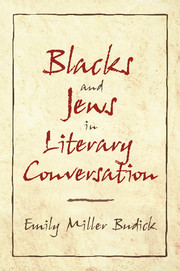Book contents
- Frontmatter
- Contents
- Acknowledgments
- Introduction: “Because you were strangers in the land”
- 1 Mutual Textual Constructions of Black–Jewish Identity
- 2 Crisis and Commentary in African–Jewish American Relations
- 3 Race, Homeland, and the Construction of Jewish American Identity
- 4 Cultural Autonomy, Supersessionism, and the Jew in African American Fiction
- 5 “The Anguish of the Other”: On the Mutual Displacements, Appropriations, and Accommodations of Culture (Toni Morrison, Cynthia Ozick, William Styron, Philip Roth, Grace Paley, and the Jewish–American–Israeli Critic)
- Notes
- Index
4 - Cultural Autonomy, Supersessionism, and the Jew in African American Fiction
Published online by Cambridge University Press: 06 July 2010
- Frontmatter
- Contents
- Acknowledgments
- Introduction: “Because you were strangers in the land”
- 1 Mutual Textual Constructions of Black–Jewish Identity
- 2 Crisis and Commentary in African–Jewish American Relations
- 3 Race, Homeland, and the Construction of Jewish American Identity
- 4 Cultural Autonomy, Supersessionism, and the Jew in African American Fiction
- 5 “The Anguish of the Other”: On the Mutual Displacements, Appropriations, and Accommodations of Culture (Toni Morrison, Cynthia Ozick, William Styron, Philip Roth, Grace Paley, and the Jewish–American–Israeli Critic)
- Notes
- Index
Summary
Jews, as such, until I got to high school, were all incarcerated in the Old Testament, and their names were Abraham, Moses, Daniel, Ezekiel, and Job, and Shadrach, Meshach, and Abednego. It was bewildering to find them so many miles and centuries out of Egypt, and so far from the fiery furnace.
James Baldwin, The Fire Next TimeIn 1987, Toni Morrison published a book that quickly became a classic of contemporary American literature. Like much African American literature, especially by women, Beloved focuses on the African American experience independent and autonomous of the white world. White society does not by any means disappear from the text. It is not, however, a subject in its own right. Instead, as if reversing the dominant assumptions of much fiction written by whites, it hovers over the story as both context and pressure, an informing principle to be understood only through reference to black life itself.
Beloved, in other words, deals only obliquely with white people. It deals not at all with Jews or Jewish history. Yet Morrison prefaces her text with two statements that might seem to turn the book toward just this subject of the Jews. One such piece of text is her dedication to “Sixty million and more.” In the American context, this dedication cannot, especially to a Jewish readership, but recall the “six million” of the Holocaust.
- Type
- Chapter
- Information
- Blacks and Jews in Literary Conversation , pp. 161 - 199Publisher: Cambridge University PressPrint publication year: 1998

